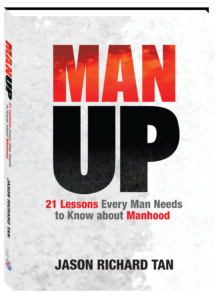Photo by Camilla Carvalho on Unsplash
The first time I met him was in a drug rehabilitation facility for men. Randy was a lean, tall guy. He was quiet, avoided eye contact, and was non-engaging. His kind face, cluttered by facial tattoos, made him look intimidating. At 22 years old, he has been in and out of two drug rehabilitation centers, kicked out of his home several times and has been in jail a couple of times for minor offenses. He is a self-confessed bisexual and is HIV positive.
The tattoo on his left temple succinctly summarized his life. It read c’est la vie, which means “That’s life.” For most people, this is just a saying, but for Randy this summarizes his philosophy in life. He has pretty much relinquished to fate what life is going to be for him. His is a life of reckless abandon.
Randy’s life is a classic example of the impact of having no positive father-figure.
His dad died when he was 7 years old, a time when a father’s presence is most crucial in the life of a boy. Soon after, his mom remarried. His stepdad was never abusive, but neither was he engaging nor involved in Randy’s life growing up. It was almost like he had no father at all. Randy desperately needed affirmation, guidance and love from a father, but didn’t get it. Soon Randy became angry deep inside.
Numerous studies show the debilitating effect of fatherlessness. According to the National Center for Fathering,
Children from fatherless homes are more likely to be poor, become involved in drug and alcohol abuse, drop out of school, and suffer from health and emotional problems. Boys are more likely to become involved in crime, and girls are more likely to become pregnant as teens. (http://www.fathers.com/statistics-and-research/the-consequences-of-fatherlessness/).1
A few months ago, we did a two-day workshop on the topic of forgiveness to 35 men in another drug rehabilitation center. At one point, I asked who among them believed they needed to forgive someone in their life. All 35 men admitted they needed to forgive at least one person in their life. And when I asked, “Who among you need to forgive your father?” Seventy percent of them raised their hand.
In my opinion, fatherlessness is at the root of the cause of drug use and drug abuse, and other ailments of society, which are mere symptoms of a dysfunctional family. Dysfunctional families lead to dysfunctional individuals, rebelliousness, brokenness.
Fatherlessness, however, doesn’t always mean physical absence, because while a father may be physically present 24/7, he is still an absentee father if he is emotionally detached and uninvolved in the lives of his children, just like in the case of Randy. On the other hand, I know of OFW fathers who intentionally make up for their physical absence, making sure they are involved in their children’s lives even if they are far away for most of the time. What drives our children to stray from the good path and embrace rebellion in the form of things such as drugs, sex, vices and bad company is not the mere presence of the father, but rather the emotional absence of a father – an uninvolved father, an uncaring father.

The first meeting I had with Randy and two other men in the drug rehab facility began a journey. We decided to meet once a week for a couple of hours just to talk about life. After a few months, I decided to write a few paragraphs as a point of discussion. Soon, it became the basis for the chapters of the book Man Up.
Yet, the point of being a father is not confined in a book. The book or any material is just the springboard or launch pad to connect with your children, or mentee. What is more important is the relationship that is built as a result of intentionally spending time with them.
Here are practical ways to be a dad, or a positive male figure to someone:
- Decide to be there for them. Your presence is important. The greatest gift any child could have from a father is their presence.
- Affirm your love and concern for them. Your words are life giving. It nourishes the soul, it affirms the heart, and it brings joy. So articulate your love for them. Don’t let them guess.
- Provide direction in life. Your guidance is important. They need to know that someone expects them to do well.
- Affirm their identity. We live in a society that attacks a person’s sense of worth and identity. Fathers have a strong influence over their children’s identity and destiny. He who rocks the cradle rules the world.
After a year of meeting with him, Randy’s journey changed. His face was bright and his smile was contagious. The tattoos in his face were hardly noticeable. He agreed to have it removed through a painful and very expensive laser process. He is now preparing to be a family counselor.
Having the ability to sire children does not automatically make a man a father. A true father is a man who intentionally invests his life and heart to his child, for as long as there is a tomorrow.
1 This statement is supported by various data coming from the U.S. Census Bureau, U.S. Department of Health and Human Services, U.S. Department of Education, National Center for Education Statistics, and various other journal studies.

Dr. Jason Richard Tan is the best selling author of Man Up: 21 Lessons a man needs to know about manhood (2017). He is the president of Great Commission Missionary Training Center (GCMTC) located in Antipolo City. Together with his wife, they provide mentoring and leadership training to couples in ministry.
Dr. Tan is a graduate of Trinity Evangelical Divinity School with a PhD in Intercultural Studies (2012), and of the Asia Graduate School of Theology with a ThM in Systematic Theology (2004), and of the Alliance Graduate School with an MDiv in Missiology (2001), and of the Mapua Institute of Technology with a Bachelor of Science in Mechanical Engineering degree (1995).
Related Posts
-
David’s Goliath
Raising a child with a learning disability is likened to planning a vacation in Italy…
-
Finding Life After Death
For many parents, nothing, not even the thought of our own death, can match the…
-
Couple Goals
How can couples be better spouses to each other? Couples need to work together to…




